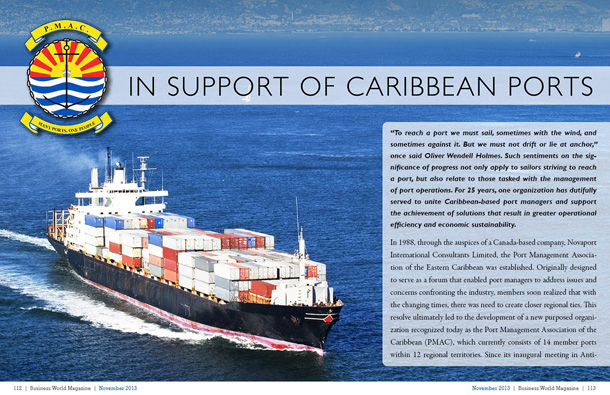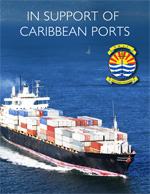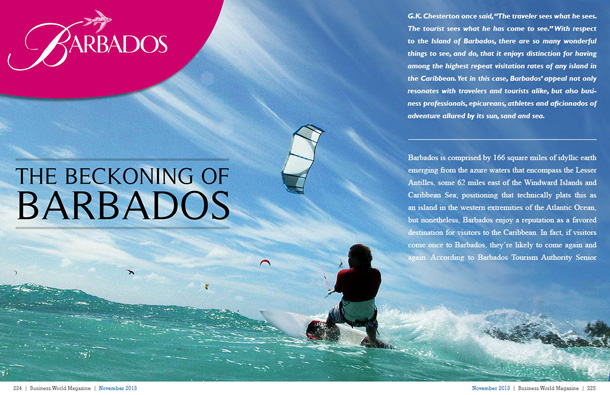
In Support of Caribbean Ports
Â

“To reach a port we must sail, sometimes with the wind, and sometimes against it. But we must not drift or lie at anchor,†once said Oliver Wendell Holmes. Such sentiments on the significance of progress not only apply to sailors striving to reach a port, but also relate to those tasked with the management of port operations. For 25 years, one organization has dutifully served to unite Caribbean-based port managers and support the achievement of solutions that result in greater operational efficiency and economic sustainability.
In 1988, through the auspices of a Canada-based company, Novaport International Consultants Limited, the Port Management Association of the Eastern Caribbean was established. Originally designed to serve as a forum that enabled port managers to address issues and concerns confronting the industry, members soon realized that with the changing times, there was need to create closer regional ties. This resolve ultimately led to the development of a new purposed organization recognized today as the Port Management Association of the Caribbean (PMAC), which currently consists of 14 member ports within 12 regional territories. Since its inaugural meeting in Antigua in 1998, PMAC has grown to become a critical resource for port managers through the establishment of programs, events and tools which effectively help members glean greater insight on best practices and solutions for overcoming challenges. As PMAC Chairman Lenius Lendor explains, “We provide a crucial role in bringing ports together for networking, for sharing information and ideas on how to solve problems. As we learn from each other, we are more able to arrive at optimum solutions. We all face common problems, but we embrace a philosophy that where there is unity, there is strength … we can face problems better as a collective rather than as a single port.â€
PMAC’s ultimate aim is to increase the operational proficiency of member ports and the quality of services offered to their users. In the fulfilling of this mission, the Association has since become respected as one of the leading voices of authority on port management and port operations matters in the Caribbean. In addition to facilitating collaboration of regional ports through the development of training, job exchange programs and sharing of human resources, PMAC is a leader in the promotion of professionalism in port administration within the region. It is the fundamental conduit from which uniform and sustainable practices can be integrated throughout Caribbean port operations, all driven by a mandate for service excellence.
Excellence in Education
Service excellence is critical in an industry which so significantly serves the Caribbean economy. As PMAC Associate Member Chairman Dr. Fritz Pinnock says, “The value of our ports is sometimes not immediately recognized. These are significant drivers of employment, and many ports not only support tourism, but also cargo operations … there may be separate docks, but the same staff and same management system is fulfilling the work.†Dr. Pinnock, who also serves as Executive Director of the Caribbean Maritime Institute, says the continuity of duties performed by service providers therefore compels the need for training standards. PMAC, he says, “puts a tremendous focus on training,†and members benefit by having more affordable access to education programs and training initiatives through the sharing of costs and resources. As an integral resource and supporter of PMAC, the Caribbean Maritime Institute has created vital, customized curriculum specific to the training of port professionals. For example, in one recent training initiative, 19 employees of Barbados Port Inc. and the Shipping Association of Barbados earned certification in ‘Stevedoring Operations Level III’ and ‘Essentials of Occupational Safety & Health Standards for Maritime Port Operations Level I’ qualifications. This training provided the participants with critical certification as supervisors within the shipping industry. CMI routinely provides such training, but again, PMAC members benefit from an established fund that helps offset training costs, as well as the ongoing series of workshops and special presentations conducted during technical sessions of PMAC’s Annual General Meeting.
Common Solutions for Common Challenges
Having a highly skilled workforce is not the only common need for PMAC members, as all are striving to achieve greater efficiencies to mitigate operational costs. With respect to those costs, PMAC’s former Chairman and current Consultant, Everton Walters CBE, explains that many are misguided about the nature of port fees in the Caribbean. He says the majority of ports exist as quasi-government entities whose service costs are not only impacted by fuel and labor costs, but when taken as a whole, would include those derived from all the other players such as Customs, Port Health, Shipping Agents, Brokers etc. within the maritime logistics chain. These fees can vary from one Caribbean Island to the next, and as Walters says, “There are challenges beyond the ability of any one of us to control, but together we can find solutions to achieve greater efficiency and cost effectiveness within the operations that we do control.â€
PMAC provides a platform for imparting ideas and strategies that promote greater efficiency and cost savings. As an example, Walters indicates that one member port has begun utilizing solar powered energy to decrease its dependence on oil. As the advantages of alternative energy are analyzed and determined, this information is imparted throughout the entire Association so members can benefit from lessons learned in the adopting of new practices.
PMAC has already demonstrated its role in driving practices which have made the industry not only more efficient, but more safe. During Walters’ tenure as PMAC Chairman, the Association played a critical role in the development and industry adoption of the International Ship and Port Facility Security Code (ISPS Code). This comprehensive set of measures was designed to enhance the security of ships and port facilities, largely driven by the wake of 9-11 terror attacks in America. The ISPS Code takes into account that ensuring the security of ships and port facilities is a risk management activity, and provides a standardized, consistent framework for evaluating risk, enabling Governments to offset changes in threat with changes in vulnerability for ships and port facilities, through determination of appropriate security levels and corresponding security measures. For his role in effectively coordinating the implementation of the ISPS Code in 2004, Walters earned PMAC’s prestigious “Honorary Membership Award†for outstanding service, yet his contribution to the Maritime Industry has garnered other high distinctions which include being honored as a Commander of the Order of the British Empire (CBE).
Beyond the need for greater security, Walters says all member ports confront challenges arising from operational costs as well as limitations in resources and restrictive practices born from the varying nuances of the social and political systems within their respective locations. Unlike private ports, these aspects pose challenges in terms of capital investment and operational flexibility. Walters says he believes there is need for greater participation from the Private Sector, not necessarily outright privatization, but greater collaboration and commitment, which indeed, is another aspect of the work being performed by PMAC.
Most specifically, in terms of collaboration, PMAC has forged strategic alliances with a range of industry professionals and entities which now help position Caribbean ports with greater opportunities in the future. In addition to Memoranda of Understanding (MOUs) previously established with the Inter-American Committee on Ports of the Organization of American States, and the Caribbean Maritime Institute, a Memorandum of Understanding between PMAC and the Gulf Ports Association of the Americas was enacted in June of this year to enable collaboration to facilitate international trade and new business between the two regions through the undertaking of joint initiatives.
Similarly, a MOU enacted between PMAC and the Caribbean Shipping Association, which provides a framework to pursue cooperative projects of mutual interest (primarily in the areas of training and security) is expected to increase the force and effectiveness of their efforts in matters relating to port security; ensuring the safety of passengers, crew members, vessels and port facilities.
By focusing on professional development, industry collaboration and communication, PMAC continues to broaden its outreach in playing an important role in the development of strategies that help port managers achieve greater operational proficiency and economic prosperity for the future.
To learn more about the work being performed by the Port Management Association of the Caribbean, visit the Association’s website at www.pmac-ports.com.








